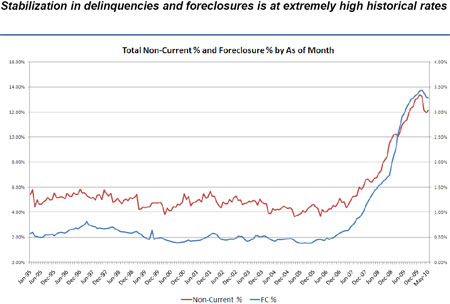From RealtyTrac:
1st Half YOY Change in Foreclosure Notices
New Jersey – Up 52.97%2nd Quarter YOY Change in Foreclosure Notices
New Jersey – Up 75.48%June 2010 YOY Change in Foreclosure Notices
New Jersey – Up 79.51%2nd Quarter Bank Reposessions
New Jersey – 2,846 PropertiesJune 2010 Bank Reposessions
New Jersey – 896 PropertiesJune 2010 Sheriff Sale Notices
New Jersey – 937 Properties
From Bloomberg:
U.S. Home Seizures Rise 38% to Record as Banks Process Backlog
A record 269,962 U.S. homes were seized from delinquent owners in the second quarter as lenders set a pace to claim more than 1 million properties by the end of 2010, according to RealtyTrac Inc.
Home seizures climbed 38 percent from a year earlier and 5 percent from the first quarter, the Irvine, California-based data company said today in a statement. More than 1.65 million properties received a foreclosure filing, including notices of default, auction and bank repossession, in the first half. That was up 8 percent from the first six months of 2009.
“Foreclosures haven’t peaked yet,” Nicolas Retsinas, director of Harvard University’s Joint Center for Housing Studies in Cambridge, Massachusetts, said in a telephone interview. Unemployment suggests that bank repossessions may climb for another six to nine months, he said.
…
One in 78 U.S. households received a foreclosure filing in the first half, and filings surpassed 300,000 for the 16th consecutive month in June, RealtyTrac said. A total of 529,633 homes were seized by lenders — the last stage of the foreclosure process — in the first half, said Daren Blomquist, the data firm’s marketing manager.
…
California led in total filings as 340,740 properties got a notice, down 15 percent from the previous six months and almost 13 percent from a year earlier, according to RealtyTrac.Florida was second with 277,073 properties, down 9 percent from the previous six months and up 3 percent from the first half of 2009. Arizona was third at 91,484, down almost 2 percent from the previous period and up by a similar proportion from a year earlier.
Other states among the 10 highest totals were Illinois at 85,223; Michigan at 78,509; Georgia at 71,949; Texas at 64,883; Nevada at 64,429; Ohio at 59,927; and New Jersey at 36,542.



